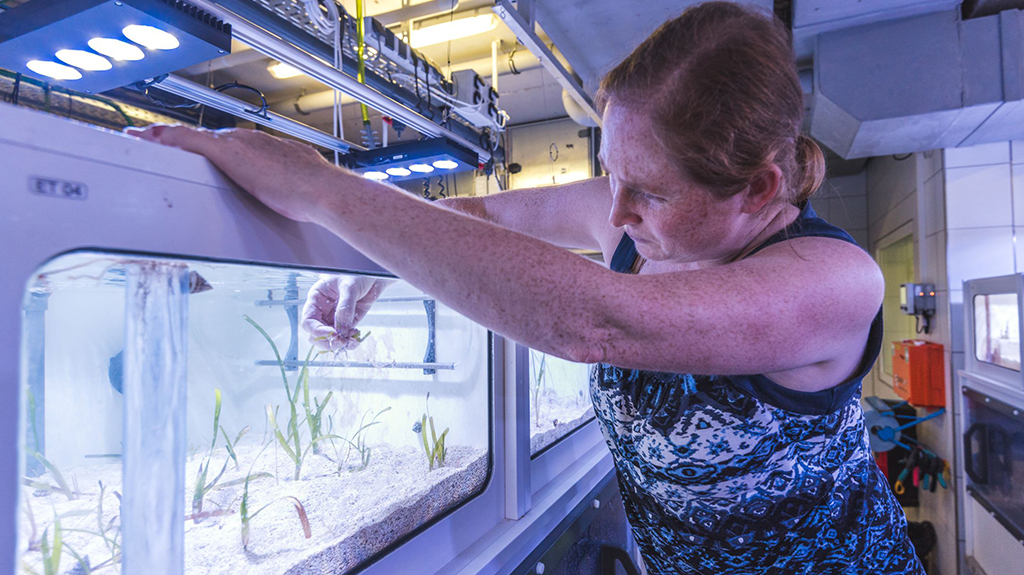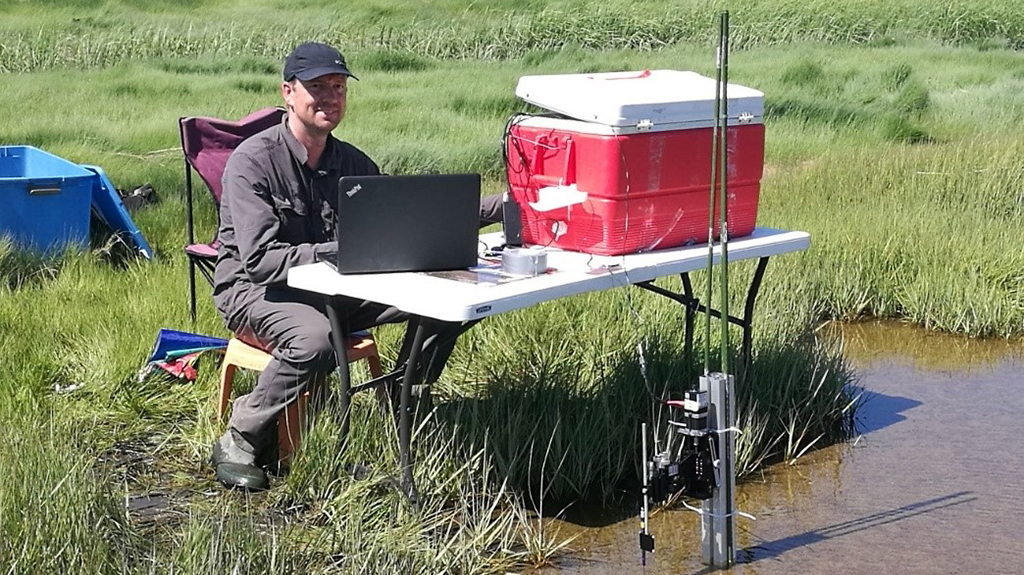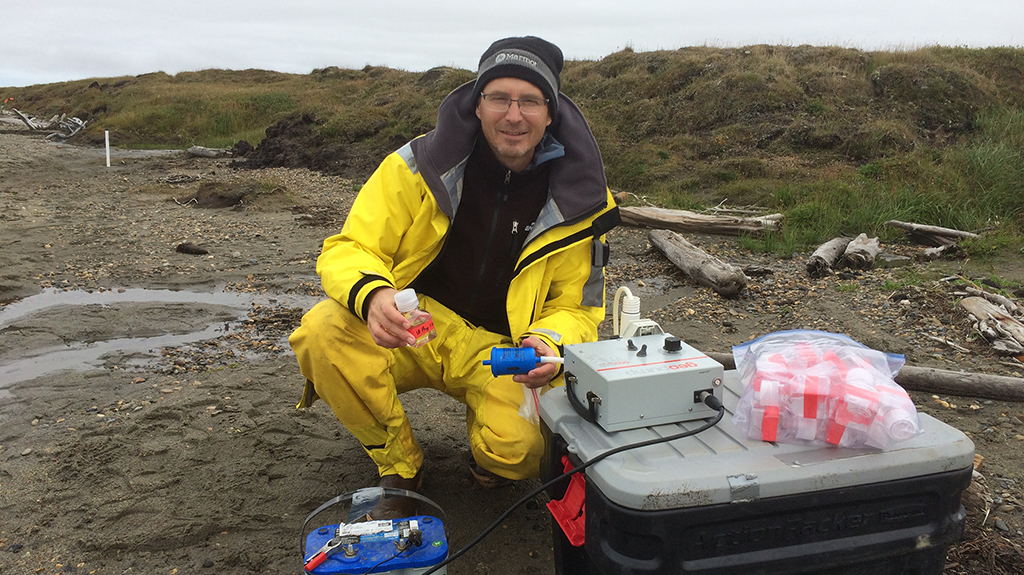Five New Faculty to Arrive, Expanding MBL’s Resident Science Program

The MBL is growing. Three new scientists are joining the Ecosystems Center over the next year, and two more will join the Josephine Bay Paul Center for Comparative Molecular Biology and Evolution.
“We have added seven new faculty in the last four years, including Emil Ruff in November of 2018 and Blair Paul in September of 2019,” said David Mark Welch, MBL’s Director of Research. “This is a significant net increase that moves us toward our goal of 29 to 30 resident faculty.”
The scientists joining the Bay Paul Center, Andrew Gillis and Kate Rawlinson of University of Cambridge, were hired in 2020 but the pandemic has delayed their arrival. An announcement of their appointment will come next year.
The three Ecosystems Center hires all have longstanding connections with the MBL and with the coastal field sites where MBL scientists have built deep expertise. “We are very excited to have these outstanding scientists joining the faculty,” said Anne Giblin, director of the Ecosystems Center.
A warm welcome to:
Mirta Teichberg, joining MBL in September 2021
MBL Title: Associate Scientist, Ecosystems Center and Director, Semester in Environmental Science (SES) Program
Current Affiliation: Leibniz Centre for Tropical Marine Research, Bremen, Germany
 Mirta Teichberg in her seagrass lab. Seagrass meadows, like coral reefs, provide a critical habitat for a great diversity of marine life, including fish, mollusks and crustaceans. Credit: Tom Vierus, Leibniz Centre for Tropical Marine Research (ZMT)
Mirta Teichberg in her seagrass lab. Seagrass meadows, like coral reefs, provide a critical habitat for a great diversity of marine life, including fish, mollusks and crustaceans. Credit: Tom Vierus, Leibniz Centre for Tropical Marine Research (ZMT)Mirta Teichberg is a marine ecologist focused on the responses of plants and their associated communities to environmental change. At the MBL, her main research interests will include “studies to promote seagrass recovery on Cape Cod, regionally, and abroad by improving water quality and finding successful methods of seagrass restoration,” she said. “This will involve basic and applied research with local stakeholders from the community.” She also plans to “integrate seagrass restoration with sustainable aquaculture activities.”
“I am very much looking forward to working with the students and faculty of the Semester in Environmental Science program to develop new directions of study while maintaining the history and core values of the program,” Teichberg said.
Teichberg was in residence at the MBL from 2001-2007 while earning her Ph.D. in the Boston University Marine Program. Working with MBL Distinguished Scientist Ivan Valiela, she studied macroalgal bloom dynamics, particularly in Waquoit Bay in Falmouth but also in Europe and South America. “Since then, I usually visit Woods Hole every summer with my family and stop by at MBL to keep up with its scientists and research activities,” she said.
Ketil Koop-Jakobsen, joining MBL in January 2022
MBL Title: Assistant Scientist, Ecosystems Center
Current Affiliation: Alfred Wegener Institute, Wadden Sea Station, List, Germany
 Ketil Koop-Jakobsen investigating oxygen, pH and carbon dioxide dynamics in tidal ponds at the Plum Island Ecosystems LTER site in northeastern Massachusetts. Photo: Anne Giblin
Ketil Koop-Jakobsen investigating oxygen, pH and carbon dioxide dynamics in tidal ponds at the Plum Island Ecosystems LTER site in northeastern Massachusetts. Photo: Anne GiblinKetil Koop-Jakobsen is a coastal scientist who focuses on the interplay between plants, microbes and soil chemistry. At the MBL, he will be exploring how these interactions affect the major nutrient cycles, carbon storage, and greenhouse gas release. “I am also enthusiastic about exploring new research applications of my optode equipment for imaging oxygen, pH and carbon dioxide in sediments, animal tissues, and other systems, in collaboration with the Woods Hole scientific community,” he said.
Koop-Jakobsen completed his PhD (2008) in the Boston University Marine Program, which was based at the MBL from 1969 to 2008. “Over the years, I kept in contact with the Ecosystems Center and continued to do collaborative research,” he said, particularly in Great Sippewissett Marsh, Falmouth, and at the Plum Island Ecosystems LTER on the northern Massachusetts coast. In fact, Koop-Jakobsen will be coming to Woods Hole this fall to continue his research.
James McClelland, joining MBL in June 2022
MBL Title: Senior Scientist, Ecosystems Center
Current Affiliation: University of Texas at Austin
 Jim McClelland in the field at Jago Lagoon, along the Alaskan coast of the Beaufort Sea. Credit: Craig Connelly
Jim McClelland in the field at Jago Lagoon, along the Alaskan coast of the Beaufort Sea. Credit: Craig ConnellyJames (Jim) McClelland’s interests are in coastal ecosystems, especially the effects of human activity on water, carbon, and nutrient fluxes from land to sea. At MBL, he is “really excited to get involved in the Plum Island Ecosystems LTER,” he said. “My work primarily focuses on biogeochemical transport and processing in watersheds and coastal ocean systems, and the PIE-LTER is a fantastic place to do that.”
McClelland graduated from the Boston University Marine Program in 1998, where he worked with MBL Distinguished Scientist Ivan Valiela. He subsequently worked at the MBL Ecosystems Center from 2001-2006, first as a postdoctoral associate, then as a research associate, and finally as an assistant research scientist. During that period, he mainly collaborated with MBL Senior Scholar Bruce Peterson and former MBL scientist Max Holmes and also worked on a project with MBL Distinguished Scientist Jerry Melillo.